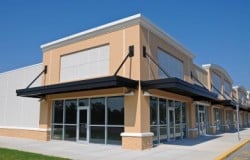On the HGTV show, Fixer Upper, Chip and Joanna Gaines help homeowners pick the worst house on the block and make it as beautiful as its nearby competition. In the corporate real estate world, however, it isn’t that easy to market a property that resembles so many others in your community.
This is why curb appeal is so important in commercial real estate. Consider the following as marketing cues to highlight for potential buyers:
- Convenient parking for easy access
- Large energy efficient windows for natural light and heating/cooling advantages
- Energy efficient fixtures for daily use
- Commercial landscaping for absolute curb appeal
While incorporating these features is outside the scope of your role, you can, however, work with the property builders before the listing goes live to learn what features you can highlight in your marketing materials. In some cases you can even suggest features that will help sell the property.
As you approach potential buyers, you also have the power to provide suggestions to them as well in case they are already thinking of hiring a contractor to customize the space to suit their needs. Being a commercial real estate agent or broker means making connections widespread throughout the real estate industry, so use these to your advantage to help market your properties.
After any and all renovations have taken place, here are some talking points you will want to highlight in your marketing materials and property showings.
Water Conservation Commercial Options
Identify if there are water conservative options available in the space. These can include low flow toilets, motion sensor hand water faucets and low-drip irrigation systems for outdoor landscaping. Take a moment to study the actual landscaping, as many commercial builders incorporate drought-friendly plants along with xeriscaping or artificial grass landscaping. This allows to building owner to save on landscape maintenance and, if applicable, property association fees.
Commercial Green Energy Solutions
For many business owners, overhead costs are a huge part of the monthly budget, so it is important to showcase the energy efficient options available in the building showings. Energy costs make up a large slice of overhead costs. If the building features solar panels, discuss the benefits of paying a flat fee all year long for the energy generated while receiving reimbursement later for energy saved through the solar panels (Department of Energy).
Check for automated systems for lighting, as well as heating or cooling. If the builder has integrated motion sensor light triggers, this can help cut down lighting costs. New technology also allows business owners to have control over lighting, heating and cooling remotely through smart phone applications. While some of these may cost more to install up front, they can provide more savings over the term of the lease or mortgage.
Some commercial property buyers may ask about LEED credits. Be knowledgeable in local ordinances applying to LEED credits, but you do not have to be experts. This is where your network of local professionals also comes in handy in case they need additional information.
You can, however, communicate the different options that will help buyers save money by becoming a green property owner. In fact, many business owners may even qualify for LEED credits or tax breaks within their city or state just by implementing some of these eco-friendly initiatives (U.S. Green Building Council):
- Solar panels
- Water-conservative landscaping
- Alternative transportation
- Green cleaning
- Sustainable lighting
There are ways to help communicate the bonus points of commercial properties, and commercial curb appeal is a huge component of the sale.






